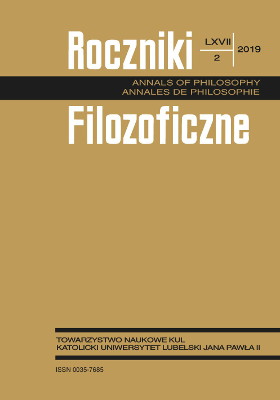Does God’s Inconceivability Explain His Hiddenness? Remarks from the Point of View of Personalistic Theism
Abstract
One of the counterarguments to the hiddenness argument that gains the popularity in the recent years refers to the inconceivability of God. If God is transcendent, state the proponents of the argument (i. e. Michael Rea and Roger Pouivet), then we do not know if the divine love is expressed in the openness to personal relationships with finite beings, as the first premise of the hiddenness argument claims. They accuse J. L. Schellenberg of shaping the concept of God on the model of modern concepts of person. In response I am indicating at the fact that even though there is a danger of anthropomorphism in Schellenberg’s writings, personalistic theism is bound to accept the first premise of the hiddenness argument. I justify my thesis by referring to the scholastic principle that allows to attribute to God all perfections and by arguing in favour of the thesis that personhood (understood in terms of rationality and freedom) is one of the perfections.
References
Anzelm z Canterbury. 2007. Monologion. W: Idem. Monologion. Proslogion. Przełożył Leszek Kuczyński, 20–187. Seria dwujęzyczna AD FONTES. Kęty: Wydawnictwo Marek Derewiecki.
Besançon, Alain. 2017. Współczesne problemy religijne. Przełożył Wiktor Dłuski. Warszawa: Teologia Polityczna.
Boecjusz. 2007. Traktaty teologiczne. Przełożyli Agnieszka Kijewska i Rafał Bielak. Seria dwujęzyczna AD FONTES. Kęty: Wydawnictwo Marek Derewiecki.
Davies, Brian. 2006. The Reality of God and the Problem of Evil. London, New York: Continuum.
Dennett, Daniel. 2014. „O prawdach, które nie sięgnęły celu”. W: Daniel Dennett i Alvin Plantinga. Nauka i religia. Czy można je pogodzić? Przełożyli Michał Furman i Łukasz Kwiatek, 69–88. Kraków: Copernicus Center Press.
Elders, Leo J. 1992. Filozofia Boga. Przełożyli Marek Kiliszek i Tadeusz Kuczyński. Warszawa: Wydawnictwo MAG.
Green, Adam, i Eleonore Stump (red.). 2015. Hidden Divinity and Religious Belief. New Perspectives. Cambridge: Cambridge University Press.
Grün, Anselm, i Tomáš Halík. 2017. Bóg zagubiony. Wiara w objęciach niewiary. Przełożył Marek Chojnacki. Kraków: Wydawnictwo WAM.
Hart, David Bentley. 2013. The Experience of God. Being, Consciousness, Bliss. New Haven, London: Yale University Press.
Hick, John. 1994. Argumenty za istnieniem Boga. Przełożył Miłowit Kuniński. Kraków: Znak
Judycki, Stanisław. 2010. Bóg i inne osoby. Próba z zakresu teologii filozoficznej. Poznań: Wydawnictwo „W drodze”.
Judycki, Stanisław. 2014. Książeczka o człowieku wierzącym. Kraków: Dominikańskie Studium Filozofii i Teologii.
Kamiński, Stanisław. 2017. Epistemologiczno-metodologiczne problemy filozoficznego poznania Boga. W: Stanisław Janeczek i Anna Starościc (red.). Filozofia Boga. Część II: Odkrywanie Boga, 9–44. Lublin: Wydawnictwo KUL.
Lévinas, Emmanuel. 2008. O Bogu, który nawiedza myśl. Przełożyła Małgorzata Kowalska. Kraków: Homini.
Lotz, Johannes Baptist. 1979. Person und Freiheit. Freiburg, Basel, Wien: Herder.
Mascall, Eric Lionel. 1988. Otwartość bytu. Teologia naturalna dzisiaj. Przełożył Sylwester Zalewski. Warszawa: Instytut Wydawniczy PAX.
McGinnis, Jon. (2015). „The hiddenness of ‘divine hiddenness’: divine love in medieval Islamic lands”. W: Adam Green i Eleonore Stump (red.). Hidden Divinity and Religious Belief. New Perspectives, 157–174. Cambridge: Cambridge University Press.
McKenzie, John L. (translation and introduction). 1968. Second Isaiah. The Anchor Bible. Vol. 20. Garden City: Doubleday & Company Inc.
Mędala, Stanisław. 2001. Chrystologia Ewangelii św. Jana. Kraków: Instytut Teologiczny Księży Marianów.
Moskal, Piotr. 2017. Metafizyczne poznanie tego, że Bóg istnieje. W: Stanisław Janeczek i Anna Starościc (red.). Filozofia Boga. Część II: Odkrywanie Boga, 247–261. Lublin: Wydawnictwo KUL.
Plantinga, Alvin. 1980. Does God Have a Nature? Milwaukee: Marquette University Press.
Pouivet, Roger. 2018. „Against Theistic Personalism: What Modern Epistemology Does To Classical Theism”. European Journal for Philosophy of Religion 10: 1–19.
Przanowski, Mateusz. 2018. „Christ as Deus Absconditus in Thomas Aquinas’s Theology”. Nova et Vetera. English Edition 16: 687–704.
Rea, Michael C. 2015. Hiddenness and transcendence, w: Adam Green i Eleonore Stump (red.). Hidden Divinity and Religious Belief. New Perspectives, 210–225. Cambridge: Cambridge University Press.
Russell, Bertrand. 2012. Dzieje zachodniej filozofii. Przełożyli Tadeusz Baszniak, Adam Lipszyc i Michał Szczubiałka. Warszawa: Aletheia.
Schellenberg, J. L. 1993. Divine hiddenness and human reason. Ithaca: Cornell University Press.
Schellenberg, J. L. 2005. „The hiddenness argument revisited (I)”. Religious Studies 41: 201–215.
Schellenberg, J. L. 2015. The Hiddenness Argument. Philosophy’s New Challenge to Belief in God. Oxford: Oxford University Press.
Stump, Eleonore. 2016. The God of the Bible and the God of the Philosophers. Milwaukee: Marquette University Press.
Tischner, Józef. 2010. Schyłek chrześcijaństwa tomistycznego. W: Idem, Myślenie według wartości, 201–223. Kraków: Znak.
Tomasz z Akwinu. 2011. O mocy Boga (tom V). Przełożyli Piotr Lichacz, Michał Paluch i Włodzimierz Zega. Seria dwujęzyczna AD FONTES. Kęty: Wydawnictwo Marek Derewiecki.
Wojtysiak, Jacek. 2012. Spór o istnienie Boga. Poznań: Wydawnictwo „W drodze”.
Copyright (c) 2019 Roczniki Filozoficzne

This work is licensed under a Creative Commons Attribution-NonCommercial-NoDerivatives 4.0 International License.





